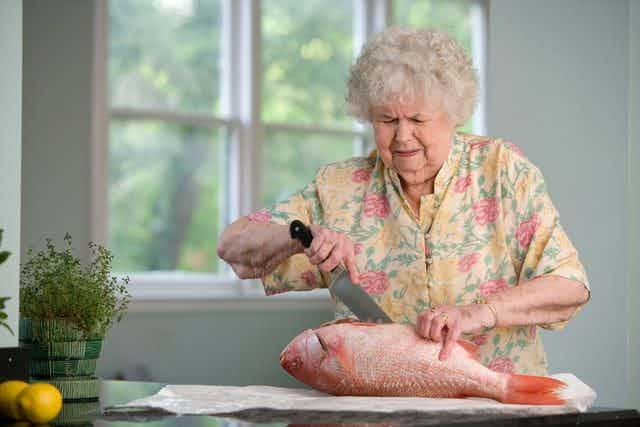You might be reading this on your phone or iPad in a nursing home, assisted-living flat, or retirement village, wondering how to find a fun new hobby. Or, perhaps you’re researching for a friend or family member. Either way, we’ve rounded up 14 fun hobbies you can do in a nursing home.
Hobbies in nursing homes
Living in retirement villages and homes can be a challenge to our identity. We don’t just move house, but our independence and daily routines change too.
A 2012 study found that sticking to activities and hobbies residents used to do before moving to a nursing home could help them maintain their identity. So, while it's great to take up new hobbies, don’t forget to keep up with old ones!
That said, finding you have more time to yourself is a great moment to try new activities. When choosing your new hobby, you know your strengths and weaknesses better than anyone. Always consider whether a particular new hobby is appropriate for you or your family member and contact your GP for advice about exercising.
1. Board games
Board games are an excellent way of bringing fellow residents together and getting to know new people. Everyone has their favourite board games, but they can feel a little monotonous after a while, especially if the same person wins every time!
We previously published an article featuring five fun board games you might not have heard of. They range in difficulty and length, so whether you’re looking to while away a whole evening or spend a quick half an hour before tea, there’s something there for you!
In particular, fans of word games should find out more about Bananagrams. The game starts with a pile of individual letter tiles for each player. You then use your tiles to make words joined up as they would be in a crossword. The winner uses their final tile before anyone else.
On their website, you can also find large letter tiles and foreign language versions of the game.
2. Colouring for adults
Over the last few years, there’s been a growing trend of adult colouring. Many retailers now stock books with complex and beautiful designs ready for you to colour in.
It's not just a way to pass the time and make something pretty, either. Research suggests that colouring is good for mental health, lowering depression and anxiety. It's also very accessible, with extensive print options and low-cost materials – an ideal hobby you can do in a nursing home!
3. Audiobooks
Audiobooks grew in popularity in the first half of 2020, with sales surging by 42%. For those of used to reading, the idea of sitting back and listening to someone else do the hard work might be a little strange.
But, as author Neil Gaiman says, “you often get much more insight into a story or poem by hearing it.” Audiobooks bring stories to life in a new way, with professional voice actors to guide you through the narrative.
What’s more, you get used to the narrator’s voice, which can be a comforting present if you spend a lot of time on your own or are in an unfamiliar place. Audiobook downloads are almost instantaneous and are available on free, one-time payment, and subscription platforms, meaning there's a lot of choice!
We recently published an article comparing audiobooks and paper books, with information on how they work and where to find them. You can read more here.
4. Exercise for older adults
According to the NHS website, many adults aged over 65 spend, on average, ten or more hours a day sitting or lying down. There is strong evidence that people who are active have a low risk of serious diseases, strokes, depression, and dementia.
The problem is, once we're out of the habit of exercising, it can feel like there's no way to get it back. But the fitness levels we have now aren’t permanent. If you build up your daily exercise little by little, you’ll be surprised at what you can achieve!
To get started, visit the NHS Live Well website, which advises how much you should exercise based on your age group. Age UK also has some at-home exercises you can try. Those with mobility issues or medical conditions should consult their GP before taking up a new exercise regime. They can advise on which activities are most suitable.
Depending on where you live, you might also be able to access exercise classes or similar hobbies in your nursing home. Take a look and see what’s on!
5. Write or jot down ideas
Some of us have secretly harboured a belief that one day we would write a book. But for others, the thought of writing regularly is a little alien. Either way, getting into the habit of writing can be extremely rewarding.
You might jot down daily experiences, memories, professional knowledge, or try your hand at fiction. For the latter, the National Centre for Writing has plenty of free resources, including beginners guides to writing short-form poetry and short stories.
Writing prompts are another great tool to get creative ideas flowing, like these from Writers Digest. Your first few attempts might not be perfect, but the more you write, the easier it should get!
6. Read the paper online
Moving to a nursing home or retirement village means changing up your routine. Maybe you used to get a daily paper from the local shop or glance at three newspapers on the train. Luckily, many newspapers have moved online, offering even more content than the paper version.
Some online newspapers are free, while others require a monthly subscription payment. If you're new to reading the news online, make sure whichever website you pick is legitimate and gives you real news stories. If you're not sure where to look, the staff where you live might be able to help!
7. Bring back memories with music
The BBC has launched a service called Music Memories, centred around the idea that listening to music can help us reconnect with powerful memories.
The service organises popular music by genre, country, and year to help you find tunes that you love. You can listen on the same website or create a playlist via Spotify or Apple Music. Alternatively, you can listen to one of their pre-made programmes filled with music from specific decades and regions.
8. Watch live streams
Watching reruns of your favourite shows is entertaining, but watching live streams can make you feel like you’re part of a shared experience with other people across the country or world.
For example, you can find live streams of plays and concerts, a hobby you can easily do in a nursing home or similar. These aren’t always free, but they make a great alternative to attending in person if you can't make it out as often as you'd like.
Time Out often lists theatre shows that you can stream on specific days. Or, if you prefer live music, Classic FM is the place to stay up to date on live-streamed classical music concerts. Although many of these were set up due to Covid-19, some might be live-streamed in the future, too.
9. Excursions
Your retirement village or nursing home might offer local excursions. This could be the nearby farmers market or a trip to a community group. Some charities might be able to send someone to accompany you out where you’d like to go, too.
Even if the destination isn’t somewhere you'd typically go, you could have a lot of fun spending time with other residents and trying something new!
10. Bird watching
Many of us enjoy spotting feathered friends who stop to visit, but have you ever thought about making it a hobby you can do in a nursing home?
If your accommodation allows it, you could put up a bird feeder to attract more visitors. The Woodland Trust offers excellent tips on which types of food appeal to different birds. For example, robins, blue tits and long-tailed tits enjoy suet balls, while mealworms are a favourite of blackbirds, starlings and robins.
You could buy a bird book or look online to help you spot who’s flying around. What’s more, The RSPB (The Royal Society for the Protection of Birds) has excellent resources to help you get started. Their website includes advice on the equipment you’ll need and how to tell tricky species apart.
11. Get up to date with tech
Have you got a knack for computers, or does technology mystify you? It might not seem like a hobby per se, but brushing up on your digital skills can help you connect with others and find fun activities.
To get started, Age UK has a wealth of information about using the internet, including downloading apps, chatting on WhatsApp, setting up email, and, very importantly, staying safe online.
On the other hand, maybe you're super tech-savvy and could become a digital buddy for others who need a little help? Digital buddies inspire older people in the community to make the most of the technology at their disposal.
12. App-based puzzles
If you're a fan of puzzles and have access to a smartphone or tablet, you're in luck! Puzzle apps are all the rage, and there are plenty to choose from. You could go for a classic crossword app or something that works more like a game.
Ensure you research the type of app you want to download and look at reviews and ratings to see how good it is. Also, be careful of in-app purchases that spend real money and check the app is legitimate. If you’re not sure, why not ask friends or family members to help, or head to Age UK’s app downloading guides?
13. Crafts
Most of us have tried our hand at crafts at some point in our lives, even if it was just a school art project. As adults, crafts don’t have to be simply cutting and sticking, unless that's what you enjoy! New crafts have become popular in recent years, such as ‘punch needle,' which uses yarn with embroidery-style techniques.
For inspiration, why not browse craft shop websites or keep an eye out for any crafts other residents do. You might even get a free lesson from them!
Christine Perry from Winwick Mum suggested knitting as a craft-inspired hobby, telling us: "Knitting is an excellent way to keep both your hands and your mind occupied – it uses both sides of your brain as you work your stitches so those grey cells get a good work out!
"There’s no end to the patterns that are available these days and you can knit pretty much anything you want to wear or decorate your home with. If you don’t fancy blanket squares or jumpers, why not knit socks? You may remember your own grandmother knitting them on several double pointed needles, but they are hugely popular items to knit nowadays and there are lots of needle types that will work so don’t let your memories put you off!"
14. Reading as a hobby
Reading is an excellent hobby. Entire worlds are hidden away between covers, just waiting to be discovered. Evidence also suggests that adults who read feel less lonely!
If you cannot take regular trips to a bookshop or library, you could consider using an e-book. Although you don't get the feel of paper between your fingertips, you can browse, pay, and download within minutes. Usually, you can adjust the font size, and it's an excellent alternative to holding heavy hardbacks, too.
For more inspiration about taking up a new activity, head to our hobby and lifestyle pages!








